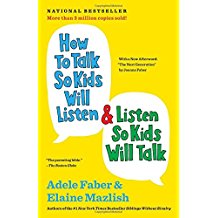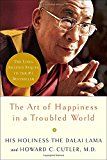RESOURCES
I have included a list of some of my favorite books for clients and those seeking personal growth. This list will be expanded as I add reviews to many of the books that I find influential or enlightening. I’m trying to include a variety of books because I believe that there are many pathways to growth and change. What works for one person might not for another.
In line with my theoretical approach to counseling, I encourage you to put some of the strategies and principles contained in these books to action. If what you are doing in life currently is not getting you what you want, you must do something different. Start small…even a little change can have a ripple effect that serves as a catalyst for growth.
Dalai Lama, H.H. & Cutler, Howard. The Art of HappinessI had two people, within a three week time span and completely independently of one another, tell me that this is one of the best books that they had ever read. When something like that happens, you listen. I must say that this book lived up to my extremely high expectations, and I will count it as one of the most influential books that I have ever read. What can be better than tapping into the Dalai Lama’s profound wisdom on how to live a happy life? Well, what was even better was that Dr. Howard Cutler, a psychiatrist, worked collaboratively with the Dalai Lama on the creation of this book. He interviewed the Dalai Lama on numerous occasions and asked him the “big” questions about how to handle anxiety, grief, self-hatred, find fulfillment, etc. He would then take the wisdom of the Dalai Lama’s answers and support it with research findings from psychology as well as from his own experience and psychiatry practice. One aspect that I particularly like is the Dalai Lama’s contention that the cultivation of positive qualities, such as compassion and patience, can directly counteract negative qualities such as hatred, egotism, and anxiety. It is amazing how well critical aspects of Buddhism, positive psychology, mindfulness, and cognitive behavioral therapy (CBT) overlap. One thing that it shows me is that different disciplines such as psychology, religion, and philosophy often point to the same “truths” about how to find happiness in this lifetime. When many different paths lead to the same destination, I believe that it’s time to make a journey to that destination. I have directly endorsed this book to many friends, colleagues, and clients. Buy it, read it, reflect upon it, and then begin implementing some of it in your own life.

Faber, Adele & Mazlish, Elaine.How to Talk So Kids Will Listen & Listen So Kids Will TalkThis book is considered a classic among the numerous parenting books on the market. Faber and Mazlish take their wealth of experience as mental health practitioners, mothers, and parenting experts and create this extremely useful book. Although “How to Talk…” has been in print for many years now, its utility has in no way diminished over time. It seems particularly useful for parents of toddlers and children. You might be tempted to quickly read the whole book through within a day or two, but it would be best to focus on one chapter at a time and then try to implement some of the strategies described before moving to the next chapter. The authors organized the chapters in a workbook-like fashion to encourage you to practice the skills that you are learning. Also, they use many cartoon vignettes to illustrate how to use the parenting/communication skills. Like any other skill, refining the language and strategies that you use with your kids definitely takes practice. This book will undoubtedly expand your repertoire of effective parenting and communication skills.
Glasser, William. For Parents and Teenagers: Dissolving the Barrier Between You and Your TeenIn this provocative and accessible book, Dr. Glasser introduces his Choice Theory within the first two chapters and then uses case studies to illustrate how it can be used to assist parents in their relationships with their teenagers who are experiencing various types of difficulties (e.g., depression, drug addiction, anger, anorexia, friction with their parents). I find his case studies fascinating, which make Dr. Glasser’s book an enjoyable, compelling read. Although I do not agree with everything Dr. Glasser proposes, he provides a philosophical approach as well as practical suggestions that can help parents and teachers improve their relationships with teenagers. I have found Reality Therapy (Dr. Glasser’s therapeutic approach based on Choice Theory) to be beneficial in my practice and have used Choice Theory successfully in my own life to improve my relationships with others as well as my general perspective on life. (Note: This book was formerly titled “Unhappy Teenagers.”)
Tolle, Eckhart. The Power of Now: A Guide to Spiritual EnlightenmentA client actually recommended this book to me, so I followed his advice. Mr. Tolle teaches readers how to unlock the “power of now” and makes his case using logic, philosophy, spirituality, and theology. In a nutshell, Mr. Tolle eloquently explains the undeniable truth that we only live in the now and that when we focus our awareness on things that happened in the past or what may/may not happen in the future, we are missing out on the richness of the present moment. It reminds me of the line in the Carly Simon song “Anticipation” when she sings, “These are the good old days.” Moreover, focusing on the past or future tends to create a discontent within us (e.g., longing, sadness, regret, guilt, anger). We gain much power and wisdom when we learn to embrace the truth that we only live in the present moment. Of course, there is more to the book than my synopsis, but part of the appeal of “The Power of Now” is in the way in which Mr. Tolle conveys this message. Although he gets a little “out there” at times as he conjectures about issues, such as the nature of psychological and spiritual pain, I believe there is a lot to learn (and relearn) within this book. It might help you to actually stop and smell the roses…but read his book first!



